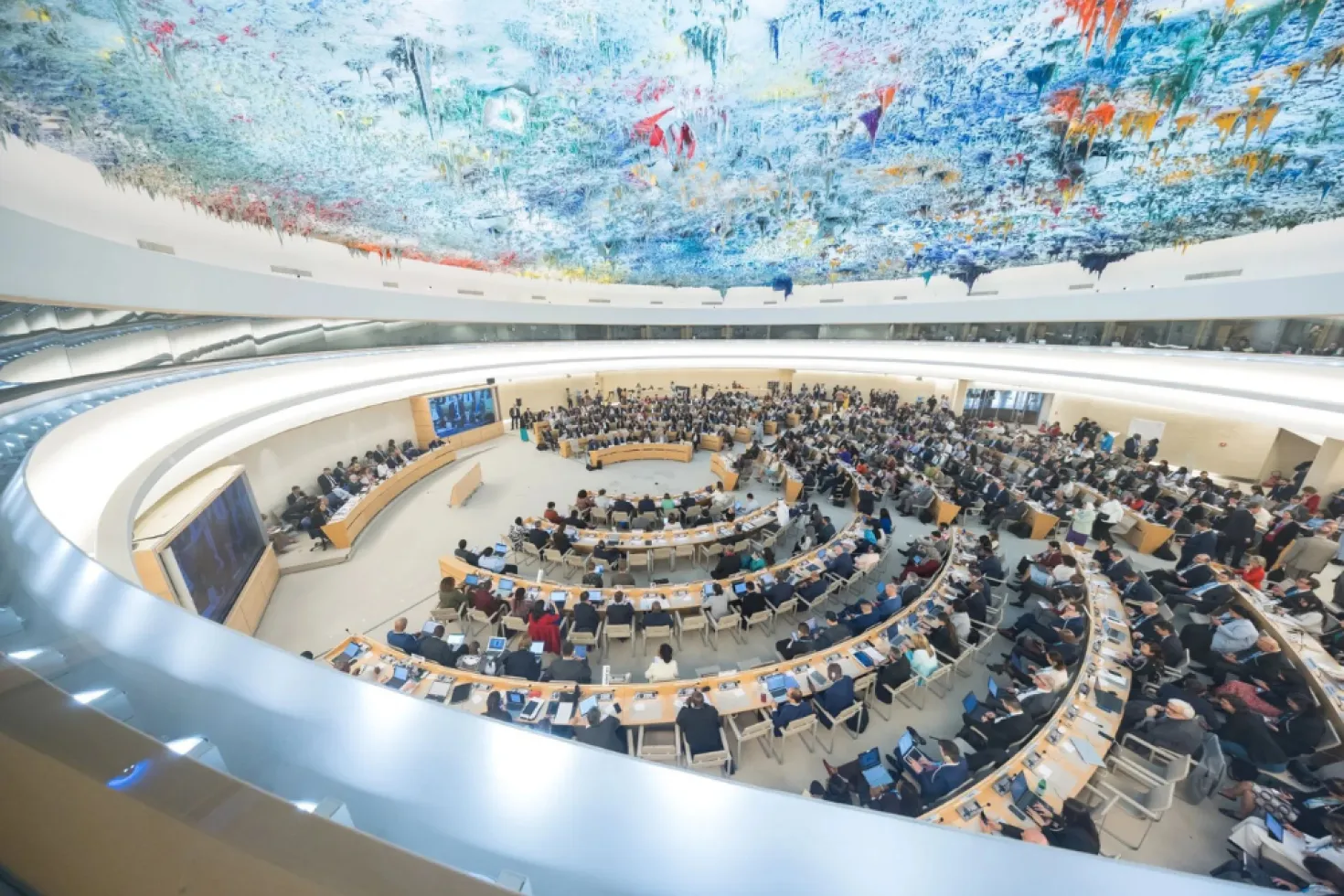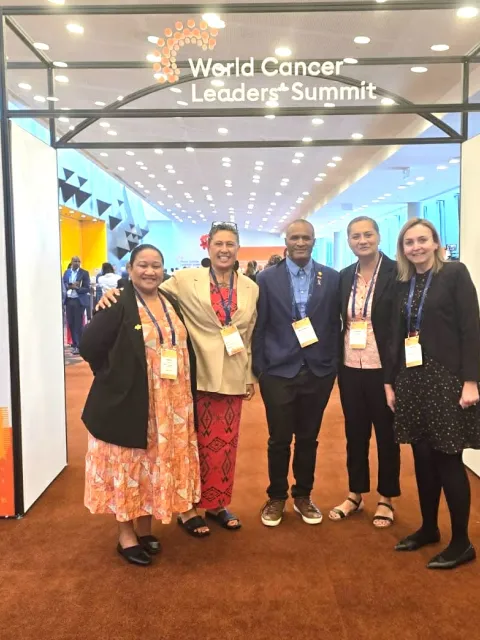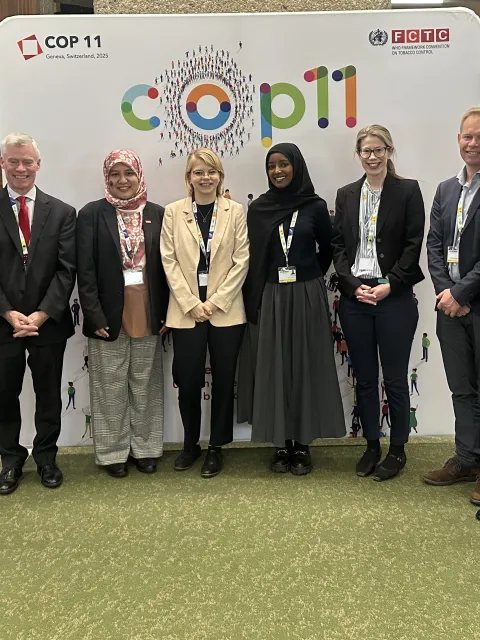UICC welcomes the adoption of the landmark WHA resolution on lung health
The World Health Assembly has adopted a landmark resolution on integrated lung health – an achievement long supported by UICC. In the lead-up, UICC and Malaysia’s Ministry of Health convened a multi-stakeholder event highlighting the work of the UICC-led Lung Cancer Collaboration and the growing momentum for coordinated lung cancer strategies.

HIGHLIGHTS
- The World Health Assembly adopted a global resolution on integrated lung health calling for a coordinated response to lung cancer, COPD, asthma, tuberculosis, and other lung diseases, as well as to and shared risk factors such as air pollution and tobacco use.
- Malaysia led the proposal design, while UICC and WHO collaborated with multiple governments and organisations through the UICC-led Lung Cancer Collaboration.
- UICC and the Ministry of Health of Malaysia organised a side-event at UICC, where speakers emphasised the need for early detection, primary care integration, and addressing tobacco use as well as air pollution, a leading cause of lung-related deaths.
- The event highlighted innovations such as Australia’s upcoming digital lung cancer screening programme and Egypt’s extensive population screening and care initiative.
The World Health Assembly has adopted a landmark resolution on integrated lung health, which UICC, along with its members and partners, has been supporting since its design. This resolution sets the stage for a more coordinated global response to lung cancer and other respiratory diseases.
Malaysia played an instrumental role in designing the proposal, while UICC worked closely with national governments and the World Health Organisation (WHO) to shape and support the resolution’s adoption.
“With this resolution, countries have collectively recognised the need to connect the dots between lung cancer, COPD, asthma, tuberculosis and air pollution in a single, coordinated approach. UICC and the Lung Cancer Collaboration have shown that when we align expertise, political will, and investment, we can create real momentum.”
– Cary Adams, CEO, UICC
The resolution was highlighted at a lunchtime event co-hosted by UICC and the Malaysian Ministry of Health at UICC’s offices in Geneva. The gathering marked the work of the UICC-led Lung Cancer Collaboration (LCC), highlighting political leadership and practical innovations aimed at improving prevention, early detection and care for lung conditions.
Around 50 participants attended, from a wide array of sectors and regions. They included representatives of ministries of health, WHO, IARC, the Secretariat of the Framework Convention on Tobacco Control (FCTC), civil society, and LCC partners AstraZeneca, Boehringer Ingelheim, and MSD.
“Investment in preventative and primary healthcare systems is critical. By embedding lung health earlier in the pathway and strengthening capacity at the community level, we can improve access to care for lung diseases, including lung cancer, especially in low- and middle-income countries. The lung health resolution is a vital step toward elevating lung health as a global health priority. It recognises the interconnectedness of lung diseases due to shared risk factors, and calls for a coordinated response.”
– David LeDuc, Senior Director for Global Oncology Policy & Advocacy, AstraZeneca, a partner in the LCC
Malaysia’s Minister of Health, H.E. Datuk Seri Dr Dzulkefly Ahmad, emphasised the resolution’s potential to support existing national policies focused on primary care, tobacco control and industry interference, and clean air policies, calling for continued integration of services across the disease spectrum. Discussions highlighted the urgent need for earlier detection and better integration of services, particularly in primary care, and to address risk factors.
Air pollution was particularly noted as a much lesser known yet leading risk factor for lung disease, now contributing to more deaths annually (eight million) than tobacco use.
Speakers shared national innovations and collaborative strategies, offering concrete examples of how integrated lung health approaches are already being implemented on the ground.
“Adoption of the resolution is a great step forward for lung health, the challenge now before us is one of implementation and that starts with knowledge of the resolution. I hope stakeholders travelling home from WHA carry the resolution with them and are local champions to drive change by ensuring policymakers are aware of the resolution adoption and begin to take steps towards implementation.”
– Michael Hartevelt, Global Oncology Policy HQ Lead, MSD

The Lung Cancer room is a dedicated space for the lung cancer community to stay connected, share knowledge, and exchange key insights from lung cancer experts.
Australia is expected to launch in early July a new national lung cancer screening programme, made possible through dedicated tobacco excise funding. It is the country’s first new screening programme in two decades and the most digitally advanced to date.
A promising initiative in Egypt has screened 10 million people using a digital risk questionnaire, out of which 80,000 were referred for low-dose CT scans. The initiative is now being expanded to include smoking cessation support and pulmonary care pathways.
"Boehringer Ingelheim fully supports the WHO resolution on promoting and prioritizing an integrated approach for different lung diseases like lung cancer of pulmonary fibrosis. This resolution is a pivotal step towards improving early detection and ensuring equitable access to high-quality treatment for patients worldwide."
– Aileen Rice-Jones, Public & Government Affairs Lead, Boehringer Ingelheim
In addition to national updates, speakers emphasised the importance of global evidence and risk-based screening, the need to address misdiagnosis, tobacco industry interference, aligning TB and lung cancer efforts, and lessons from chronic respiratory disease responses.
“Implementation is where the real impact lies. Through the LCC, we will continue to support countries, partners and communities to translate this into stronger systems, smarter policies and better lung health outcomes.”
– Yannick Romero, Senior Knowledge and Advocacy Manager and lung cancer lead, UICC
Last update
Monday 26 May 2025
